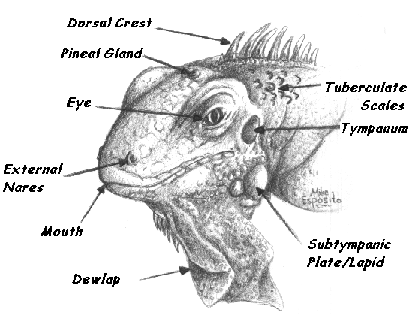

Iguana Dictionary

Ambient - external or outside
Ambient Temperature - outside air temperature
Anorexia - Loss of appetite
Arboreal - Pertaining to a tree dwelling habitat
Back Slapping - When the Iguana is lying on its stomach with arms at their sides flipping them upward
Bacteria - Any of numerous groups of one celled organisms which are involved in infectious diseases
Calcium - a mineral used by the body to create strong bones and in other metabolic functions
Carnivorous - Flesh or meat eating
Carrier - An animals that is a host to parasites or bacteria
Cloaca - Posterior opening of both the excretiatory and reproductive tracts
Cross-Feeding - The transferring of uneaten food to another animal
Dermatitis - A skin infection
Dewlap - Throat fan, vertical loose flap of skin connected to the throat region
Digits - Fingers or toes
Disinfect - to kill microorganisms
Diurnal - Daily or being active in the daytime.
Dorsal - Pertaining to the back
Dorsal Scales - Scales found on the back of the body
Dystocia - Difficulty in delivering eggs or young
Ecdysis - The shedding of the skin
Ectotherm - Cold blooded
Femoral Pores - the row of dots located on the underside of the rear legs
Gout - accumulation of urate crystals in tissues sites
Gravid - Pregnant
Heat Strip - Electrical heating element used for under cage heating
Hemipenes - paired male sexual organs
Herbivorous - Vegetarian or preferring a diet plant material
Hypercalcemia - Abnormally high blood calcium level
Hyperphosphatemia - Abnormally high blood phosphorus
Hypervitaminosis - condition in which the animal is overdosed on vitamins.
Hypocalcemia - Abnormally low blood calcium level
Hypophosphatemia - Abnormally low blood phosphorus
Hypovitaminosis - Condition in which the animal is lacking sufficient vitamin levels
Host - The animal in which parasites or bacteria is present
Hot Rock - Electrical heating device in the form of a rock
Mites - a small parasite that feeds off of an animal
Necropsy - Post mortem examination
Nares - Nostrils or Nasal openings
Nocturnal - To be active at night
Omnivorous - Both flesh eating and plant eating
Oviparous - Laying Eggs
Parasite - An organism that lives in or on a plant or animal of another species from which it obtains its nutrients
Photoperiod - time interval between day and night
Prolapse - Falling out
Renal - Pertaining to the Kidneys
Rostral - Pertaining to the nose or front of the head
Salmonella - Bacteria that enters the digestive track causing severe food poisoning
Salmonellosis - Food poisoning cause by the consumption of salmonella bacteria
Sneezing - Commonly occurring process in which excess salts are expelled
Substrate - Bedding or covering for the floor of a cage
Tail - Part of the animal posterior to the cloaca
Tympanum - a drumlike vibrating structure functioning as a hearing organ also know as an ear
Thermal Burns - Burns occurring from coming in contact with a heating device
Vermiculite - Light weight absorbent heat resistant material used when incubating eggs
Viable - being alive or still living
Search |